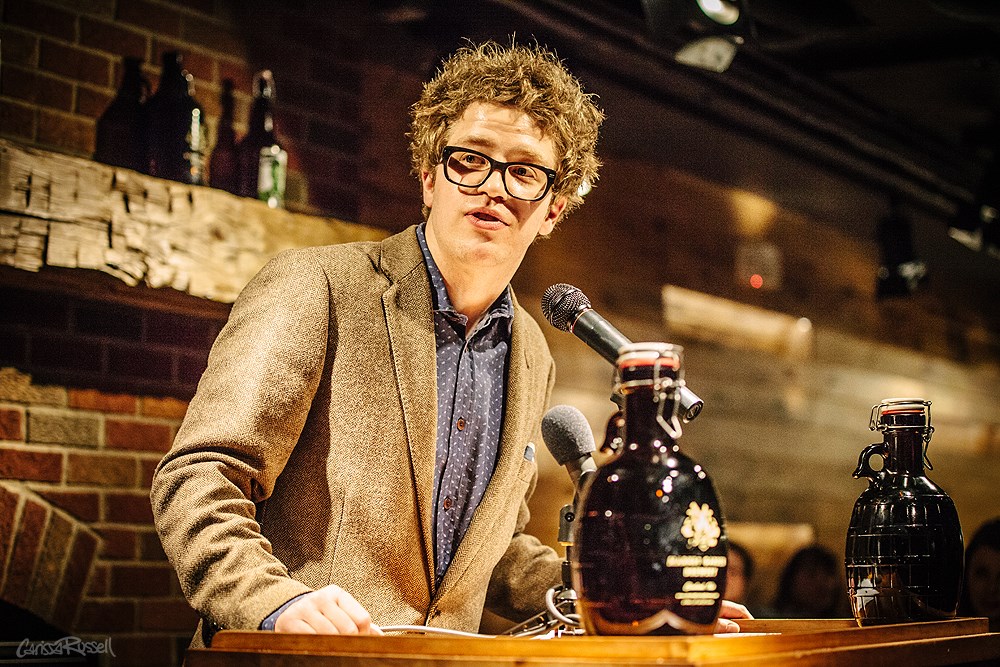Column by Ohio Poet Laureate Dave Lucas
But does poetry actually change anything?
Does it need to?
Maybe poets are, as Percy Bysshe Shelley writes, “the unacknowledged legislators of the world.” Or maybe W. H Auden is right that “poetry makes nothing happen.”
Perhaps, like the best poetry itself, the issue is more complicated than an easy either/or, and unlikely to be fleshed out in this lifetime, much less the next thousand words.
Many poets find the whole mess—if poetry matters, can it matter, does it matter if it matters?—tired and tiresome. To write at all, after all, is to believe that it matters in some way.
Many readers and listeners may never ask these questions. They may feel the pleasure poetry offers is what matters, and beauty is its own noble end.
But some writers and audiences demand more of this art—that poetry should strive for truth in political as well as aesthetic matters, and that every aesthetic argues a political position too.
In the devastated Warsaw of 1945, the Polish writer Czesław Miłosz asked: “What is poetry which does not save / Nations or people?”
In the midst of the Black liberation and feminist movements of the Seventies, the poet and activist Audre Lorde argued that “poetry is not a luxury. It is a vital necessity of our existence. [. . .] Poetry is the way we help give name to the nameless so it can be thought.”
For Lorde as well as Miłosz, poetry must speak truth to power—because the power of poetry to speak truth is sometimes the only voice for the powerless.
Sometimes, though, “the nameless” is horror; sometimes poetry cannot save nations or people but can only memorialize them.
The September 24, 2001 issue of The New Yorker published one poem among other attempts to reckon in prose with the grotesquery of the previous week’s attacks.
That poem—“Try to Praise the Mutilated World,” written by the Polish poet Adam Zagajewski and translated by Clare Cavanagh—must have been accepted by the editors months earlier, and written and translated long before that.
“Try to Praise the Mutilated World” is not about 9/11. But for me and so many others, it spoke to that day as no other work of art could:
You’ve seen the refugees heading nowhere,
you’ve heard the executioners sing joyfully.
You should praise the mutilated world.
[. . .]
Praise the mutilated world
and the gray feather a thrush lost,
and the gentle light that strays and vanishes
and returns.
Lower Manhattan lay in mutilated ruins, but even this world, we are reminded—especially this world—must nevertheless be praised.
This poem demonstrates for me how poetry approaches—as closely as words ever can—truth.
Just as metaphor helps us grasp what something is by saying what it isn’t, sometimes the poem that best addresses an event was not written with that event in mind.
A poem need not be topical in order to stake a political claim. Often poetry plots a meandering, wayward course to truth, as water flows downhill to water.
Of course, not everyone agrees that poetry reveals truth at all. Tyrants have long recognized the danger of poetry, but so have philosophers.
When Plato describes his ideal city, in the philosophical dialogue the Republic (ca. 380 BCE), the Athenian idealist expels all the poets, claiming that poets lead people to illusion instead of the truth.
Without the allure of their beautiful words, Plato argues, poets “are like faces which were never really beautiful, but only blooming; and now the bloom of youth has passed away from them.”
That Plato condemns poets with a poetic device—a simile—is a note of irony I cannot resist. But a better answer to Plato comes from Emily Dickinson, who suggests that poetry arrives at the truth by indirect—but more persuasive—means.
I doubt that anyone has ever told it more beautifully than she:
Tell all the Truth but tell it slant—
Success in Circuit lies
Too bright for our infirm Delight
The Truth’s superb surprise
As Lightning to the Children eased
With explanation kind
The Truth must dazzle gradually
Or every man be blind—
Plato and Dickinson alike remind us that any truth is inseparable from its telling—which is why Plato thought poets so dangerous, and why Dickinson advocates for telling it slant.
In other eras, to “tell it slant” hardly seems sufficient. Maybe this is why in our own age of political, cultural, and ecological crisis, our most salient poetry often grapples with these gravest public questions through the lens of private life.
In Jericho Brown’s “Stand,” the love between two men becomes as urgent as the need to change the world, and a small way of changing that world:
Peace on this planet
Or guns glowing hot,
We lay there together
As if we were getting
Something done.
Love between and among people is a radical act, but more so when that love defies the norms of a dominant culture.
The question “does poetry change anything?” does indeed have an answer, but the answer is always “people,” and those changes often happen more slowly and subtly than we notice—less the way we change our minds than the way we fall in love.
Or, as Seamus Heaney says more eloquently in his essay “The Government of the Tongue,”
Faced with the brutality of the historical onslaught, [the arts] are practically useless. Yet they verify our singularity, they strike and stake out the ore of self which lies at the base of every individuated life. In one sense the efficacy of poetry is nil—no lyric has ever stopped a tank. In another sense, it is unlimited.
So it will not suffice to offer either “unacknowledged legislators” or “makes nothing happen.” One of the ways poetry can change us is to refuse to settle for such easy answers.
I prefer George Oppen’s revision of Shelley—poets are not the unacknowledged legislators of the world, but legislators // of the unacknowledged // world.”
And I would rather quote the entirety of Auden’s assessment of just what poetry makes, and is:
For poetry makes nothing happen: it survives
In the valley of its making where executives
Would never want to tamper, flows on south
From ranches of isolation and the busy griefs,
Raw towns that we believe and die in; it survives,
A way of happening, a mouth.
In this view, poetry is what happens. To speak a new world is to work toward it. Poetry is the change itself. Or at least, if we are wise, the beginning of that change.

Dave Lucas is the author of Weather (VQR/Georgia, 2011), which received the 2012 Ohioana Book Award for Poetry. Named by Rita Dove as one of thirteen “young poets to watch,” he has also received a “Discovery/The Nation Prize and a Cleveland Arts Prize. In 2018 he was named the second Poet Laureate of the State of Ohio. A co-founder of Brews + Prose at Market Garden Brewery and Cleveland Book Week, he lives in Cleveland, where he was born and raised.
Lead image: Photo by Thought Catalog from Pexels










